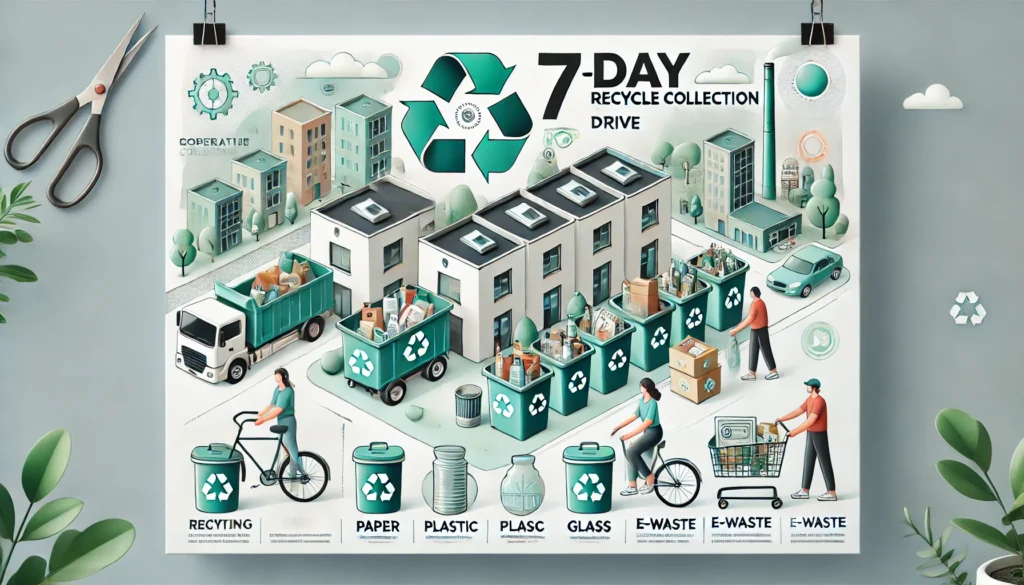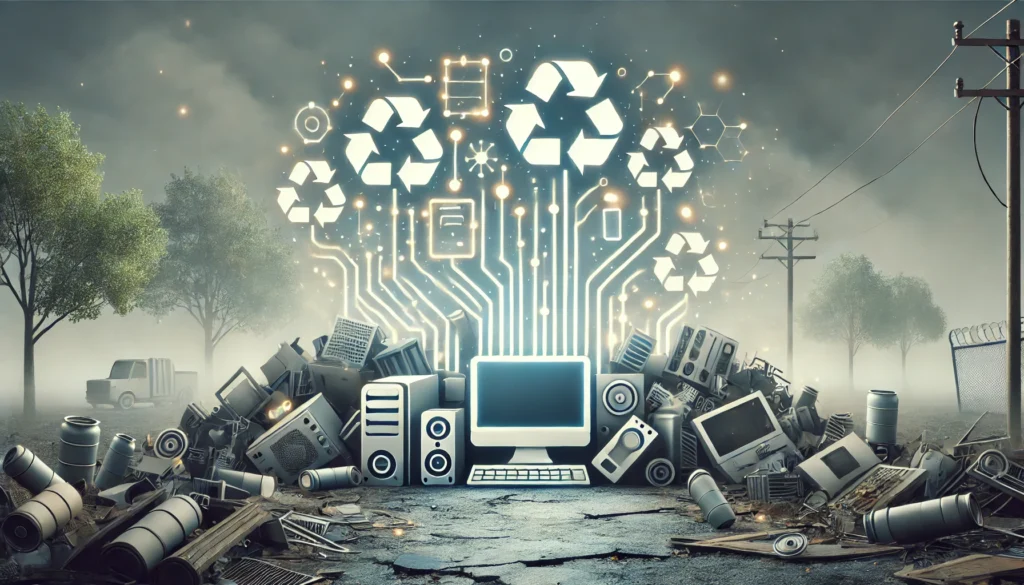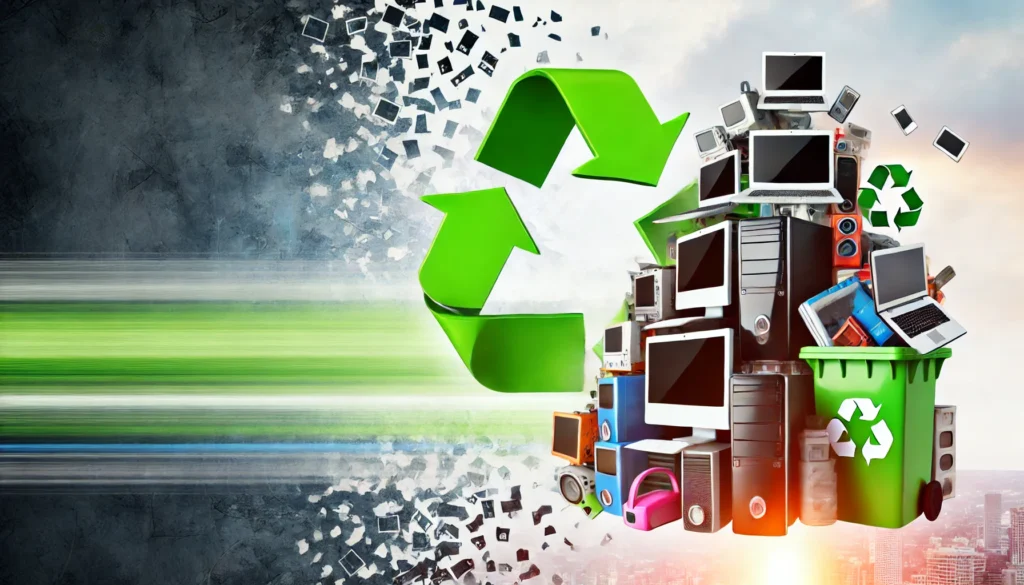Are you thinking about organizing a Recycle Collection Drive at your Cooperative Housing Society? A well-planned drive can bring the community together, reduce waste, and promote sustainable living. With the right strategy in place, you can make a significant impact. This blog post provides a detailed 7-day action plan to help you organize a successful recycle collection drive that engages all society members and helps protect the environment.
Why Organize a Recycle Collection Drive?
Every household generates waste, from old plastic bottles and paper to broken electronics and unused batteries. Many of these items are recyclable, but without a structured system, they often end up in landfills, contributing to pollution. A recycle collection drive in your housing society encourages responsible disposal of waste, educates residents about recycling, and makes a positive impact on the environment.
For example, by collecting old newspapers and magazines from every household, you reduce the need for cutting down more trees for paper production. Similarly, collecting electronic waste prevents harmful chemicals from leaking into the soil and water systems.
7-Day Action Plan for a Recycle Collection Drive
Day 1: Form a Core Team and Define Goals
The first step is to gather a small team of residents passionate about the environment and recycling. Together, define clear goals for the drive. Are you focusing on specific types of waste like paper, plastics, and e-waste, or all recyclable materials?
For example, your team might decide to focus on collecting paper, plastics, and e-waste like old phones and laptops. Defining your goals will help streamline your efforts for the rest of the week.
Day 2: Announce the Event and Set Up Collection Points
Once you’ve defined your goals, it’s time to announce the recycle collection drive to all society members. Use posters, social media, and community groups (like WhatsApp or Society Management apps) to spread the word.
Set up designated collection points around the society where residents can drop off their recyclables throughout the week. Ensure these points are easily accessible, such as at the society’s security gate or clubhouse. Label bins for different materials—paper, plastic, glass, and electronics.
Day 3: Educate the Residents
Now that the collection points are set, it’s important to educate residents about what can and cannot be recycled. Many people are unsure about what items qualify for recycling.
For example:
- Paper: Newspapers, magazines, office paper, and cardboard.
- Plastic: Water bottles, detergent containers, and plastic bags.
- E-Waste: Old phones, batteries, computers, and cables.
Host a small meeting or send out an educational flyer to clarify which items should be dropped off at the collection points. Emphasize the benefits of recycling, such as reducing landfill waste and saving resources.
Day 4: Encourage Participation with Incentives
To boost participation, consider offering incentives. For example, announce that any money earned from selling recyclables will go toward improving common areas or purchasing new children’s play equipment.
You could also offer rewards like certificates or small prizes for households that contribute the most recyclables. This creates friendly competition and encourages more participation.
Day 5: Midweek Progress Update
Send out a progress update to keep everyone engaged. Use this update to thank participants who have already contributed and remind others to bring their recyclables. For example, post pictures of the collected materials on your society’s notice board or group chat.
Additionally, if you notice that certain collection points are overflowing, consider arranging for a midweek pickup by the recycling company.
Day 6: Final Collection Day Preparation
As the final day approaches, prepare for the collection of materials. Confirm the pickup time with your recycling partner and ensure that all collected recyclables are organized and ready for transport. This is also a good time to remind residents to drop off any last-minute items they may have forgotten.
Day 7: Drive Conclusion and Clean-Up
On the last day, ensure the recycling company collects the materials on time and clean up the collection points. After the drive, send a final message to all residents thanking them for their participation. Share results—such as the total amount of recyclables collected and how the money earned will be used.
For example, if your society collected 500 kg of paper and plastic waste, you could mention how many trees were saved and the environmental impact. Transparency about how the collected funds will be used fosters trust and encourages future participation.
Examples of Recyclable Materials to Collect
To make things clearer for residents, here’s a list of common household items that can be recycled during your drive:
- Paper and Cardboard: Old newspapers, magazines, cardboard boxes, and office paper.
- Plastic: Bottles, containers, plastic bags, and packaging materials.
- Glass: Bottles, jars, and other glass containers.
- Electronic Waste (E-Waste): Old phones, batteries, chargers, cables, laptops, and other electronic devices.
- Metal Items: Aluminum cans, steel containers, and metal scraps.
By focusing on collecting these items, you can make a real difference in reducing your society’s carbon footprint.
Benefits of a Recycle Collection Drive
- Cleaner Society Environment: The drive reduces clutter from homes and society premises.
- Waste Reduction: Recycling helps minimize the waste that goes to landfills, reducing pollution and saving resources.
- Environmental Protection: Recycling e-waste prevents hazardous materials like lead and mercury from polluting soil and water.
- Community Engagement: A recycle collection drive brings the community together and fosters a sense of shared responsibility toward the environment.
A 7-day recycle collection drive is a simple yet effective way to promote sustainability in your Cooperative Housing Society. By following this step-by-step action plan, you can encourage responsible waste management and create a cleaner, greener environment for all residents. Remember, even small actions like recycling can have a big impact on the planet!
Read Marathi version of this post at “सहकारी गृहनिर्माण संस्थेसाठी यशस्वी रिसायकल कलेक्शन ड्राईव्ह मोहिमेची 7 दिवसांची कृती योजना”
Discover more from Green Ecosystem - Renewable Energy, Agriculture, and Environmental Sustainability
Subscribe to get the latest posts sent to your email.


